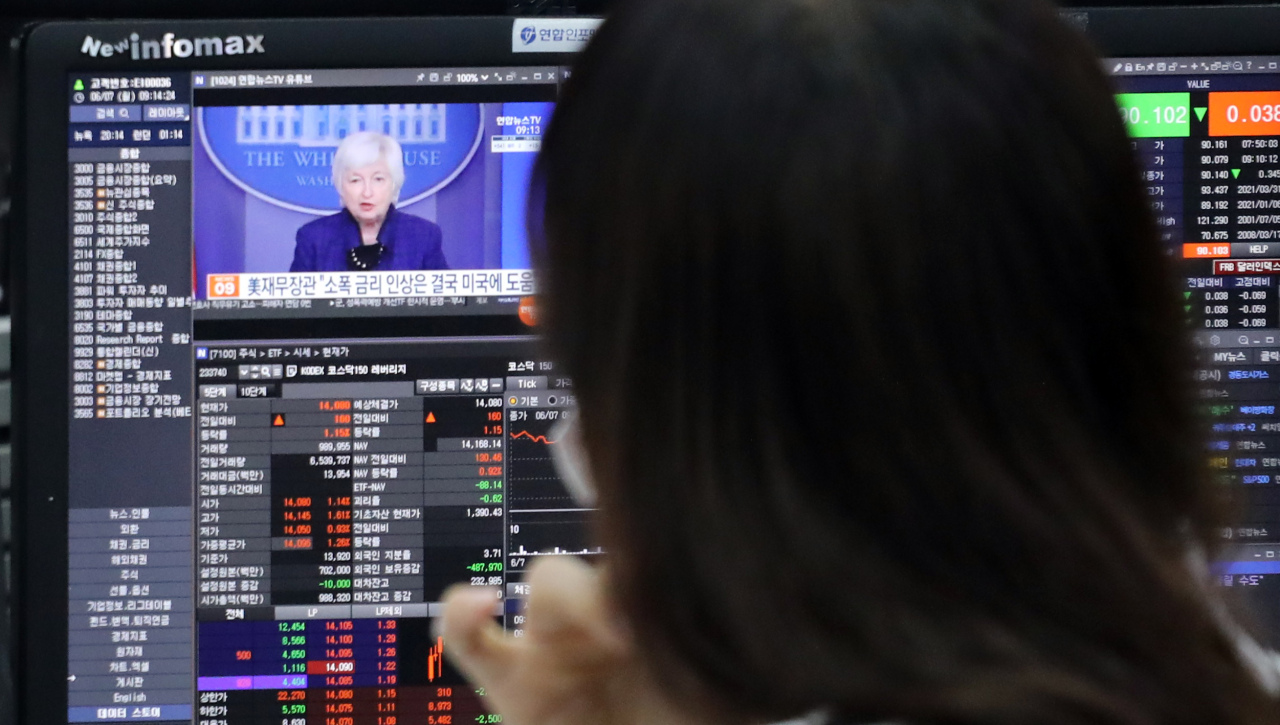 |
Staff at Hana Bank‘s dealing room in Seoul watch TV reports on market prospects over the US Fed’s interest rate hike Monday. (Yonhap) |
With growing signs of an interest rate hike from the US Federal Reserve as early as this year, a hawkish turn there will increase debt burdens in South Korea if policymakers here fail to take timely steps, a think tank said Monday.
Debt interest payments per Korean household could gain as much as 2.5 million won ($2,249.62) on average if the US Fed decides to raise its interest rate from the current near-zero level, a report from the Korea Economic Research Institute showed.
The KERI projected that a hypothetical US interest rate hike that pushed up the short-term 6-month US Treasury yield by 1.37-1.54 percentage points would increase average interest on household debt here by 1.54-1.73 percentage points.
The yield on 6-month US Treasury notes hovered around 0.07 percent in the first three months of this year.
More than 57 percent of Korean households had debt as of end-2020, an increase of 0.2 percentage point on-year, KERI said, citing data released by Statistics Korea last year.
Inflation in the US has been speeding up recently, as the economy has begun showing signs of recovery. Its consumer price index grew at a sharp pace of 4.2 percent on-year in April, marking its fastest growth in 13 years, and the International Monetary Fund recently upgraded its annual economic forecast to a robust 6.3 percent for 2021. These signs all point to an earlier-than-expected rate hike from the US Fed, according to KERI.
If Korea’s central bank fails to make timely moves, Asia’s fourth-largest economy could see a massive outflow of foreign investments as well. The rise in US short-term Treasury bonds could trigger a net outflow of as much as 1.8 billion, KERI said.
In a nutshell, the Bank of Korea faces a dilemma in picking a time frame for its own rate hike. Following in the US Fed’s footsteps too early could further burden household debt, but belated moves could trigger a massive outflow of foreign investments.
“Considering the heavy household debt, carrying out a rate hike before the US Fed is not a wise move,” said Choo Kwang-ho, head of KERI’s economic policy division.
“The Korean government needs to make efforts to stabilize the nation’s budget and debt, while bolstering the job market, which would in turn strengthen the debt cushion for households against a rate hike,” he added.
The US Fed has so far taken a cautious stance toward a possible rate hike, brushing off any surge in inflation as “temporary.” But US officials have made stronger remarks.
US Treasury Secretary Janet Yellen said in an interview with Bloomberg News on Sunday that if the US “ended up with a slightly higher interest rate environment it would actually be a plus from society’s point of view and the Fed’s point of view.” Yellen explained that US President Joe Biden’s $4 trillion spending plan would be beneficial for the economy there, even if it led to rising inflation and resulted in higher interest rates.
Meanwhile, BOK Gov. Lee Ju-yeol has started to take a more hawkish stance on the possibility of a rate hike, since the latest monetary policy meeting last month. He raised the possibility that the BOK could carry out a rate hike before the US Fed.
Korea’s household debt hit a record 1,765 trillion won in the first quarter due to snowballing mortgage lending and household borrowing for stock investment, the BOK said recently. Experts have said the current record-low interest rate of 0.5 percent is a key catalyst behind increased household borrowing.
Korea’s consumer prices grew at the sharpest pace in more than nine years in May on higher prices of farm and oil products.
By Jung Min-kyung (
mkjung@heraldcorp.com)








